Designs On The Future: Developing A Robust Ecosystem For Sustained Innovation In The UAE The UAE, a country which was largely rural just over half a century ago, has taken the lead in creating a culture of research and science to further strengthen its position on the global map.
Opinions expressed by Entrepreneur contributors are their own.
You're reading Entrepreneur Middle East, an international franchise of Entrepreneur Media.

Over the first few decades of the 21st century, innovation has emerged as a fundamental element in the growth and development of countries. The UAE, a country which was largely rural just over half a century ago, has taken the lead in creating a culture of research and science to further strengthen its position on the global map. It's what its leaders firmly believe is needed to solve regional and global challenges, and provide its population with a bright future. And they're probably right.
This February marks UAE Innovation Month, a time of the year when we take stock of all that's gone by in recent technology, and prepare for further scientific advances in our nation. We anticipate sizeable changes to our communities in the next 50 years with populations slated to double and urbanization reaching 70% by 2050, according to the World Bank. Gulf cities, in particular, are already heaving at over 80% urbanization, which directly affects their quality of life due to increased strain on infrastructure, utilities and even traffic. The move towards smarter urban alternatives has rapidly become not just a visionary directive for the future, but a necessity for many. In response to this, Dubai has boldly announced its desire to become the world's smartest city via a series of initiatives with tight deadlines. Dubai has planned a wide range of activities and programming geared towards bringing innovation to life across all sectors including 545 smart initiatives and services across eight government entities, and two smart districts with about 185 proposed projects in the transport sector.
In late 2014, the UAE government declared 2015 as the "Year of Innovation," and had launched a National Innovation Strategy with the aim of becoming one of the most innovative nations in the world by 2021. In the last few years alone, we have seen proof of just how serious this goal is, with the launch of almost sci-fi products, including flying taxis, deploying smart bus stations and embracing the hyperloop concept across the Emirate.
For the UAE to continue its journey to become one of the top 10 global economies, its continued focus on innovation and to nurture talent locally to develop a robust ecosystem of sustained innovation is vital. Dubai has gone a long way with building idea hubs and collaborative workspaces for entrepreneurs and freelancers with places like The Cribb, Dubai Design District's (d3) Co-Working Space and Micro Offices, and TECOM's in5 Innovation Centres that also provide practical opportunities for people with big ideas to network, train and develop with mentors across business sectors.
Innovation often connotes just science and technology, but design humanizes these ideas, making technology easier to adapt into our daily lives; cultivating this community of artistic and creative people, alongside more business-oriented ones, makes practical sense today. Companies like Apple are obsessively focusing on packaging cyber access while purposefully appealing to early adopters and the youth simultaneously. Why? Because they believe that research and design go hand in hand. Last summer, the Palmwood project, a new collaboration between the UAE and US-based global design firm IDEO, ran a camp where kids aged 9-14 were asked to propose ideas on how they can improve society through innovation. Many of the responses centered around designing environmentally-friendly and affordable community housing, robots that alert when someone litters and recycling objects to create anything from fashion to homeware. Palmwood regularly operates as a design consultancy working with organizations across sectors to shape learning experiences, schools, and systems that encourage creativity and kindness at the same time.

Related: Entrepreneur Middle East's Achieving Women 2017: Dr. Amina Al Rustamani










